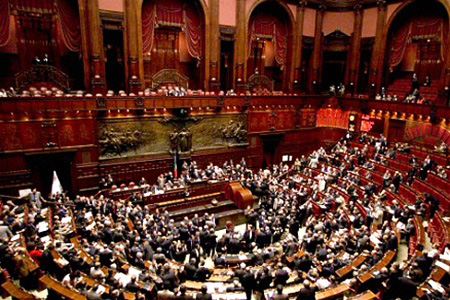Italy’s parliament will be dissolved between Christmas and the New Year, a parliamentary source said on Wednesday, opening the way for national elections in early March that look unlikely to produce a clear winner, Reuters reported.
The source said the most likely date for the vote was March 4 but added that March 11 remained a possibility, with a final decision due shortly.
A national election must be held by May, but most political parties are keen to hold elections as soon as possible, with the last major piece of legislation, the 2018 budget, scheduled to be approved before the end of the year.
“A vote on March 4? That would be excellent. The sooner we go to the polls the better,” said Matteo Salvini, head of the far-right Northern League party.
Italy’s 10-year bond yield rose to a two-week high on the election reports, with investors concerned about political uncertainty in the euro zone’s third biggest economy.
Former Prime Minister Silvio Berlusconi’s center-right alliance is seen winning the most seats at the forthcoming ballot, opinion polls say. But he looks unlikely to secure enough votes to hold an absolute majority.
The anti-establishment 5-Star Movement is predicted to emerge as the largest single party in the next parliament, but it has repeatedly ruled out joining any coalition.
Berlusconi said at a book presentation on Wednesday that Italy should return to the polls if the vote produces no clear majority, with current Prime Minister Paolo Gentiloni carrying on for “at least three months” during a new election campaign.
The often fractious alliance between Berlusconi and Salvini creaked on Wednesday when Salvini threatened to break off talks after Berlusconi’s Forza Italia (Go Italy!) party declined to back a League proposal to toughen sanctions for violent crime.
The two parties have no common platform and have not settled on a commonly agreed candidate for prime minister.
Support for the ruling center-left Democratic Party (PD), headed by former Prime Minister Matteo Renzi, has fallen steadily in recent months, with the group heavily penalized by deep schisms and personality clashes.
The parliamentary source, who was in contact with President Sergio Mattarella, said the head of state would almost certainly dissolve both houses after Gentiloni had held a traditional end-of-year news conference, set for Dec. 28.
Gentiloni will remain as a caretaker prime minister until a new government is formed, helping to guarantee political stability in the interim.
Italy’s economy is finally pulling clear of years of recession and is expected to post growth of 1.5 percent this year and next -- still lagging most of its euro zone peers.
Employers’ association Confindustria warned on Wednesday that the recovery could be jeopardized by political uncertainty.
“The next elections will be very important, placing the country at a crossroads, with one path leading to a continuation of reforms and the other leading nowhere,” it said in a report, warning parties against pursuing “demagogic measures”.
Political leaders have already made a rash of promises that economists warn could damage the country’s fragile finances, including pledges of generous handouts for pensioners and large tax cuts.






